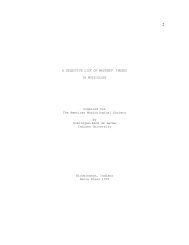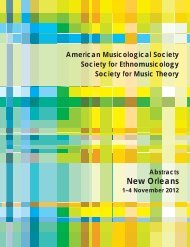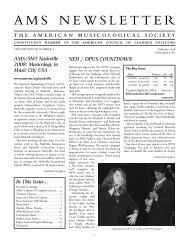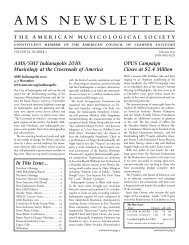AMS Philadelphia 2009 Abstracts - American Musicological Society
AMS Philadelphia 2009 Abstracts - American Musicological Society
AMS Philadelphia 2009 Abstracts - American Musicological Society
Create successful ePaper yourself
Turn your PDF publications into a flip-book with our unique Google optimized e-Paper software.
<strong>Abstracts</strong> saturday morning 115<br />
HIP HOP TRANSNATIONALISM AND DIASPORIC IDENTITY:<br />
KOREAN AMERICAN HIP HOP AND THE POLITICS OF BELONGING<br />
Hyun Chang<br />
University of California, Los Angeles<br />
What are the stakes when hip hop crosses national borders? This paper explores the way<br />
Drunken Tiger, a group of two Korean <strong>American</strong> men who launched a hip hop career in Seoul<br />
in 1999, negotiate cultural and ethnic identity within the contradictory sociocultural contexts<br />
of South Korea. Analyzing texts, sampling, and CD visual art, I will outline the ways Drunken<br />
Tiger have positioned themselves in relation to two hegemonic visions: first, anti-<strong>American</strong><br />
Korean nativism, which exerts assimilationist pressure on the group; and second, a hip hop<br />
globalism rooted in African <strong>American</strong> iconography and styles.<br />
In their first album, Drunken Tiger have portrayed themselves as the first voice of true hip<br />
hop in Seoul. Backed by a large South Korean entertainment corporation and big-time popular<br />
music entrepreneurs in Seoul, their first album showcased their capability to improvise<br />
rap in African <strong>American</strong> English and publicized their former hip hop and DJ careers in Los<br />
Angeles and Chicago. Similarly, the CD jacket evoked African <strong>American</strong> hip hop by featuring<br />
a number of youths standing defiantly against the backdrop of a graffiti-filled wall and dancing<br />
on urban dance floors in baggy jeans. These qualities distinguished Drunken Tiger from<br />
most Korean popular music groups, who did not make fine distinctions between popular music<br />
genres but instead focused on heavily scripted and synchronized dance moves. Drunken<br />
Tiger’s popularity with South Korean youth shows the extent to which claims of genre authenticity<br />
matter for an audience increasingly familiar with the stylistic and iconographic features<br />
of African <strong>American</strong> hip hop.<br />
On the other hand, Drunken Tiger’s subsequent choice to revise their earlier image and<br />
forge new forms of identification with South Korea provides insight into the politics of the<br />
local internalized by the group. Fashioning this new image has involved incorporations of nativist<br />
tropes and symbols, including folk guitar songs that were used to protest South Korea’s<br />
authoritarian regimes in the 1970s. For their album art, the group members posed in Seoul’s<br />
urban slums and captured images of the working class, translating the idea of hip hop as a<br />
voice of marginality into the local (Korean) context. The chauvinistic criticisms that challenged<br />
the group’s “Koreanness” may explain the group’s shift.<br />
Finally, in their most recent album titled “Liberation 1945” (Korea was liberated from<br />
Japanese colonialism in 1945), Drunken Tiger problematize ethnic and cultural nationalisms<br />
through ethnic drag and dis-identification. For example, they parody anti-Japanese sentiment,<br />
which constitutes the foundation of Korean nationalism, by rendering it as discursive<br />
and by parroting nationalist rhetoric in playful ways. Caricatures of liberation songs in the<br />
style of Bob Marley and of nationalist melodies serve as the sonic background.<br />
Drawing on the theories of Shu-mei Shih and José Esteban Muñoz, my paper can be read<br />
as a case study of the process by which “nonwhite Western” persons become a “problem” in<br />
the East and of the creative ways in which these uniquely situated minorities articulate the<br />
relationship between the local and the global.










